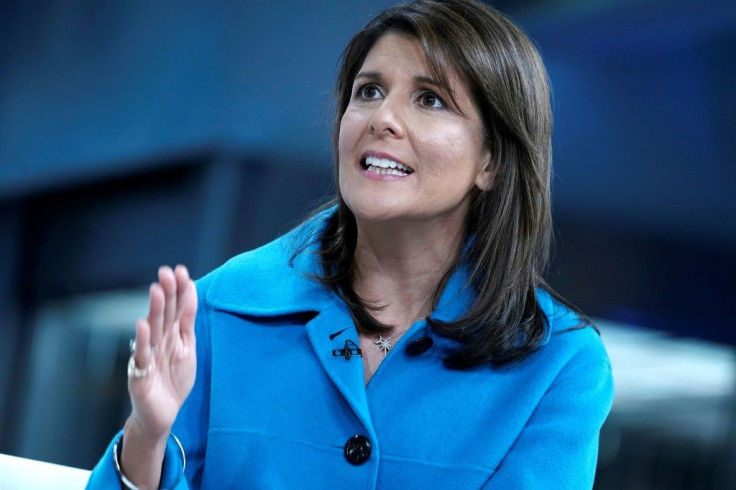Nikki Haley Quits Boeing Board To Protest Possible Federal Bailout

KEY POINTS
- Boeing is seeking $60 billion in government funds
- Donald Trump has vowed to save Boeing
- Nikki Haley served on Boeing's board for less than a year
Former United Nations ambassador Nikki Haley has resigned from the board of directors of Boeing (BA) after less than a year to protest a potential government bailout of the aircraft manufacturer.
Earlier this week, Boeing said it wanted $60 billion in government funds due to the damage caused by the coronavirus epidemic. As global travel demand has plunged for its airline customers, Boeing, already reeling from the grounding of its 737 MAX following two deadly crashes, is seeing new orders postponed.
Boeing has reportedly incurred almost $19 billion in costs related to the 737 MAX aircraft. The company is also waiting for regulatory approval for that plane model to fly again.
Boeing is seeking the federal aid for itself and its many suppliers, including United Technologies (UTX), General Electric (GE), Spirit Aerosystems Holdings (SPR) and others.
President Donald Trump has vowed to save the company, saying: “We have to protect Boeing.”
But Haley, a former governor of South Carolina and widely touted as a future Republican presidential candidate, expressed her disapproval of a possible federal bailout.
Boeing's leaders "are going in a direction I cannot support," Haley wrote in a resignation letter. “While I know cash is tight, that is equally true for numerous other industries and for millions of small businesses, I cannot support a move to lean on the federal government for a stimulus or bailout that prioritizes our company over others and relies on taxpayers to guarantee our financial position. I have long held strong convictions that this is not the role of government.”
Haley added that she will remain a "strong supporter of Boeing and its workforce" and expressed confidence in the future viability of the grounded 737 MAX plane.
While governor of South Carolina, Haley fought off efforts by Boeing’s largest union to establish a bargaining unit at their factory in North Charleston, where it manufactured 787 Dreamliner planes.
"We appreciate her service on the board and wish her well," said a Boeing spokesman.
A relief proposal by Senate Republicans would permit aviation manufacturing companies like Boeing to obtain collateralized loans and loan guarantees from a $150 billion fund.
“We are not bailing out the airlines or other industries – period,” said Senator Richard Shelby (R.-Ala.), who chairs the Appropriations Committee.
Meanwhile, Boeing faces some daunting challenges, with Wall Street expecting the planemaker to cut its dividend.
Hedge fund investor Bill Ackman, the chief of Pershing Square Capital Management, warned that Boeing is in dire straits.
“Boeing is on the brink,” Ackman said. “Boeing will not survive without a government bailout.”
Boeing shares have plunged 72% since its recent peak on Feb. 12.
“Boeing enters this aerospace down-cycle already wounded by [737] Max, and the question has started to be raised as to whether it can survive,” said Robert Stallard, an analyst with Vertical Research. This situation is “about as bad as it can get for Boeing.”
But Stallard added that as Boeing is an important military contractor, it is probably “too big to fail” and will likely get the aid it needs from Washington.
Stallard also noted that by suspending its dividend, Boeing could save $4.7 billion a year.
“Given the uncertainty that it is now dealing with, that cash could be vital,” he said.
George Ferguson, an analyst with Bloomberg Intelligence, said if Boeing failed to secure government bailout, it would likely have to close “large portions of its commercial business.”
“[A federal bailout] buys Boeing time,” he said. “But the only fix for the problem is to get the airline business back up and rolling globally.”
© Copyright IBTimes 2025. All rights reserved.





















